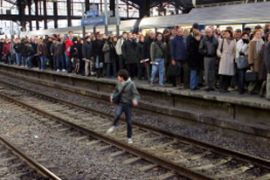Commuters caught in French walkout
Only a third of trains operate due to French union split as national strike continues.

| First person | ||
|
However, the unions’ united front appeared under strain on Friday, prompting the head of the General Confederation of Labour (CGT) union to appeal for unity to maintain pressure on the government.
“There will be a follow up if necessary,” Bernard Thibault, CGT president, said on French television.
“For that to be effective, it has to attract at least as many people as today and to do that, you have to prepare for it. And preparing for it means unity of the unions involved.”
The government wants to put state employees paying into so-called “special regimes” on an equal platform with civil servants and private sector workers – thus increasing their contribution period from 37.5 years to 40 years.
Sarkozy’s spokesman acknowledged that strong opposition had been expected, but said the government would not back down.
“The president was elected on a reform agenda and he will carry out these reforms,” David Martinon said.
“Now is the time for determination but also a willingness to listen.”
Meanwhile, Xavier Bertrand, France‘s labour minister, said that he would meet the main unions involved in Thursday’s strike next week.
“My door is open, and what I will search for with them next week is to find solutions to their main concerns…on the level of pensions,” he said on French RTL radio.
Special funds
The special funds were introduced after the second world war, mainly for workers in physically demanding jobs, but they are running deficits that will cost the taxpayer an estimated $7bn this year.
| “Now is the time for the government to listen to the rail workers and withdraw its proposals”
Stephane Leblanc of the Sud-Rail union |
Sarkozy said during his election campaign that he would phase out the regimes. He has offered talks on how best to do that while refusing to back down on the principle.
Stephane Leblanc of the Sud-Rail union predicted “an historic mobilisation” during the strike action as SNCF managers were also taking part.
“Now is the time for the government to listen to the rail workers and withdraw its proposals,” he said. Other unions have hinted that the protests could extend beyond Thursday.
Polls show strong support for the government’s changes and opposition to the strikes. Many on the left and some unions agree state pensions need reform but argue that workers should not bear the brunt of any changes.
Lengthy protests have crippled France in the past, proving fatal 12 years ago to a conservative government which was forced into a humiliating climb-down over similar pension changes.
All sides have played down the 1995 parallel. An Ifop poll on Wednesday showed 82 per cent of people backed reform of the “special regimes”, and 61 per cent opposed the strike.
The senior members of the Socialist opposition and even unions agree that state pensions must be reformed, but argue that workers should not bear the brunt of any changes.
